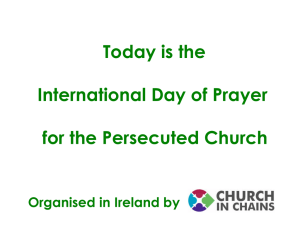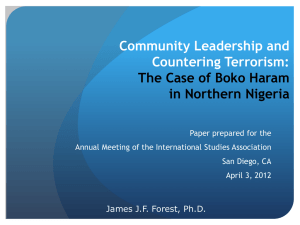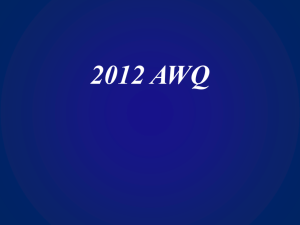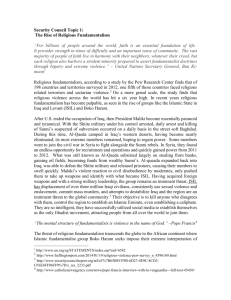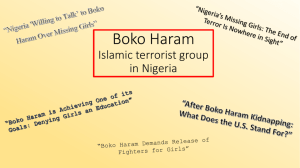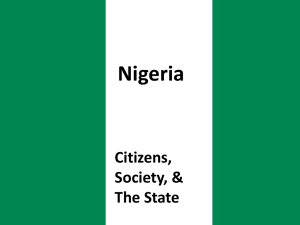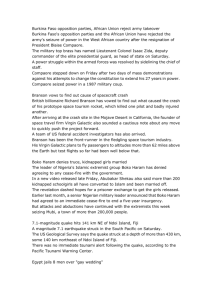Science For All Nigerians (SFAN) Amidst Security Challenges: A Reality... Academic Journal of Interdisciplinary Studies MCSER Publishing, Rome-Italy Nwona, Hyginus A.
advertisement
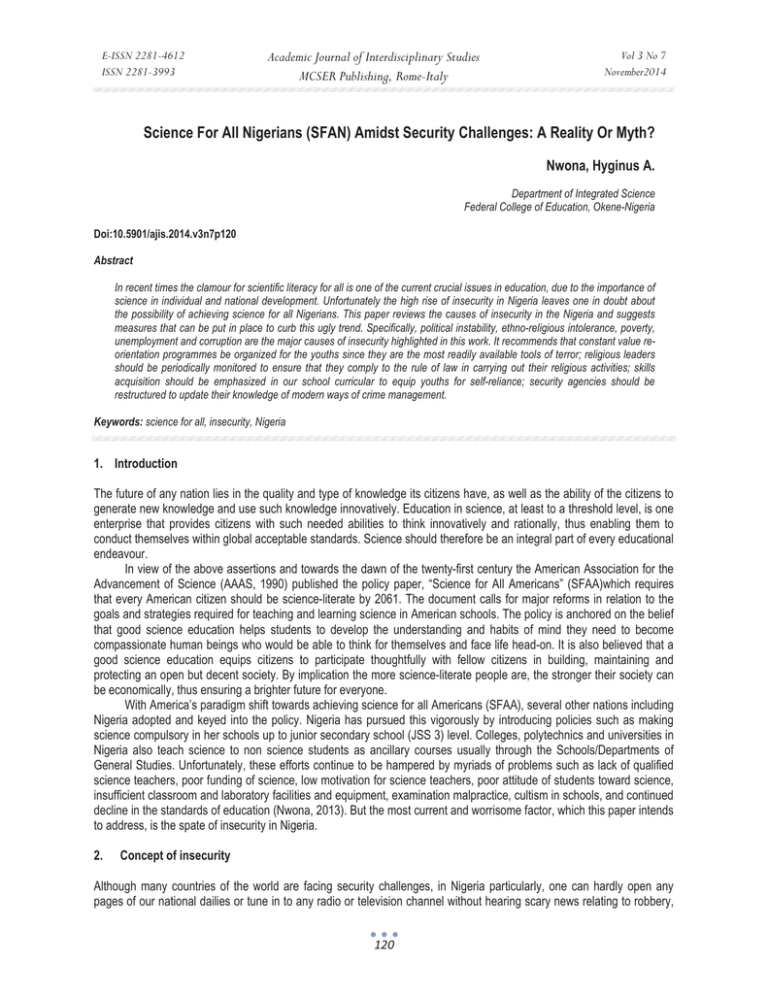
E-ISSN 2281-4612 ISSN 2281-3993 Academic Journal of Interdisciplinary Studies MCSER Publishing, Rome-Italy Vol 3 No 7 November2014 Science For All Nigerians (SFAN) Amidst Security Challenges: A Reality Or Myth? Nwona, Hyginus A. Department of Integrated Science Federal College of Education, Okene-Nigeria Doi:10.5901/ajis.2014.v3n7p120 Abstract In recent times the clamour for scientific literacy for all is one of the current crucial issues in education, due to the importance of science in individual and national development. Unfortunately the high rise of insecurity in Nigeria leaves one in doubt about the possibility of achieving science for all Nigerians. This paper reviews the causes of insecurity in the Nigeria and suggests measures that can be put in place to curb this ugly trend. Specifically, political instability, ethno-religious intolerance, poverty, unemployment and corruption are the major causes of insecurity highlighted in this work. It recommends that constant value reorientation programmes be organized for the youths since they are the most readily available tools of terror; religious leaders should be periodically monitored to ensure that they comply to the rule of law in carrying out their religious activities; skills acquisition should be emphasized in our school curricular to equip youths for self-reliance; security agencies should be restructured to update their knowledge of modern ways of crime management. Keywords: science for all, insecurity, Nigeria 1. Introduction The future of any nation lies in the quality and type of knowledge its citizens have, as well as the ability of the citizens to generate new knowledge and use such knowledge innovatively. Education in science, at least to a threshold level, is one enterprise that provides citizens with such needed abilities to think innovatively and rationally, thus enabling them to conduct themselves within global acceptable standards. Science should therefore be an integral part of every educational endeavour. In view of the above assertions and towards the dawn of the twenty-first century the American Association for the Advancement of Science (AAAS, 1990) published the policy paper, “Science for All Americans” (SFAA)which requires that every American citizen should be science-literate by 2061. The document calls for major reforms in relation to the goals and strategies required for teaching and learning science in American schools. The policy is anchored on the belief that good science education helps students to develop the understanding and habits of mind they need to become compassionate human beings who would be able to think for themselves and face life head-on. It is also believed that a good science education equips citizens to participate thoughtfully with fellow citizens in building, maintaining and protecting an open but decent society. By implication the more science-literate people are, the stronger their society can be economically, thus ensuring a brighter future for everyone. With America’s paradigm shift towards achieving science for all Americans (SFAA), several other nations including Nigeria adopted and keyed into the policy. Nigeria has pursued this vigorously by introducing policies such as making science compulsory in her schools up to junior secondary school (JSS 3) level. Colleges, polytechnics and universities in Nigeria also teach science to non science students as ancillary courses usually through the Schools/Departments of General Studies. Unfortunately, these efforts continue to be hampered by myriads of problems such as lack of qualified science teachers, poor funding of science, low motivation for science teachers, poor attitude of students toward science, insufficient classroom and laboratory facilities and equipment, examination malpractice, cultism in schools, and continued decline in the standards of education (Nwona, 2013). But the most current and worrisome factor, which this paper intends to address, is the spate of insecurity in Nigeria. 2. Concept of insecurity Although many countries of the world are facing security challenges, in Nigeria particularly, one can hardly open any pages of our national dailies or tune in to any radio or television channel without hearing scary news relating to robbery, 120 E-ISSN 2281-4612 ISSN 2281-3993 Academic Journal of Interdisciplinary Studies MCSER Publishing, Rome-Italy Vol 3 No 7 November2014 rape, murder, cultism, kidnapping, child trafficking, religious clashes, communal clashes, Boko Haram bombings, and their likes, all of which describe insecurity. The concept of insecurity can be better understood by first presenting the concept of security since the latter is the antithesis of the former. Security conveys many meanings to many people depending on the context, one common feature of all the meanings is that they refer to a condition of creating a calm and conducive atmosphere for peaceful co-existence between man and man, as well as man and his environment. For the business class, security refers an investment instrument, other than insurance policy or fixed annuity, issued by a corporation, government or other organization which offers evidence of debt or equity (www.investwords.com). The Oxford English Dictionary (online version) also defines security as the state of being free from danger or threat; the safety of an organization against criminal activity such as terrorism, theft, or espionage (www.oxforddictionaries.com). From the foregoing definitions, one may refer to security as the situation that exists as a result of the establishment of measures for the protection of persons, information and property against hostile persons, influences and actions. Insecurity is, therefore, the state of being subject or exposed to fear, worry, instability, risk, harm, injury or anxiety resulting from obvious or alleged lack of protection by relevant agencies such the government, religious organization, employer(s), family, etc. The feeling of being insecure could lead concerned individual(s), group or organization behaving in ways that may be considered abnormal. A quick look at the catalogue of attacks and killings by the Boko Haram (BH) sect from May 2011 to July 2014 describes how insecure the country has been rendered in recent times. 27 May 2011: A group of around 70 suspected BH gunmen killed eight people including four policemen in simultaneous gun and bomb attacks on a police station, a police barracks and a bank in Damboa, Borno State, near the border with Chad. 29 May 2011: Three bombs rip through a beer garden in a military barracks in the northern city of Bauchi, killing 13 and wounding 33. BH claimed responsibility. 6 June 2011: Muslim cleric Ibrahim Birkuti, critical of BH, shot dead by two motorcycle-riding BH gunmen outside his house in Biu, 200km from Maiduguri. 7 June 2011: Attacks on a church and two police posts in Maiduguri, blamed on the sect, left at least 14 dead. 16 June 2011: BH targets national police headquarters in Abuja, killing two. 20 June 2011: Seven people including five policemen killed in gun and bomb attacks on a police station and a bank in Kankara, Katsina State. 27 June 2011: BH’s gun and bomb attack on a beer garden in Maiduguri left at least 25 dead and dozens injured. July 2011: Government says it will open a negotiation panel to initiate negotiations with BH. 3 August 2011: The government rejects negotiations with BH. 25 August 2011: Gun and bomb attacks by BH on two police stations and two banks in Gombi, Adamawa State, kill at least 16 people, including seven policemen. 26 August 2011: BH claimed responsibility for a suicide bomb blast on the UN compound in Abuja, which killed 23 people. 1 September 2011: A shootout between BH gunmen and soldiers in Song, Adamawa State, killed one sect members while another is injured and captured 4 September 2011: Muslim cleric Malam Dala shot dead by two BH members outside his home in the Zinnari area of Maiduguri. 12 September 2011: Seven men, including four policemen, are killed by BH gunmen in bomb and shooting attacks on a police station and a bank in Misau, Bauchi State. The attackers rob the bank. 13 September 2011: Four soldiers shot and wounded in an ambush by BH members in Maiduguri shortly after the arrest of 15 sect members in military raids on BH hideouts in the city. 17 September 2011: Babakura Fugu, brother-in-law to slain BH leader Mohammed Yusuf, is shot dead outside his house in Maiduguri two days after attending a peace meeting with Nigeria’s ex-President Olusegun Obasanjo in the city. BH denies any involvement in the incident. 1 October 2011: A butcher and his assistant are killed by BH gunmen at Baga market in Maiduguri in a targeted killing. In a separate incident, three people are killed in a shoot-out following BH bomb and shooting attacks on a military patrol vehicle delivering food to soldiers at a checkpoint in Maiduguri. All three victims are civilians. 3 October 2011: Three killed in BH attacks on Baga market in Maiduguri, Borno State. The victims included a teaseller, a drug store owner and a passer-by. 121 E-ISSN 2281-4612 ISSN 2281-3993 Academic Journal of Interdisciplinary Studies MCSER Publishing, Rome-Italy Vol 3 No 7 November2014 23 Oct 2011: BH members kill a policeman and a bank security guard in bombing and shooting attacks on a police station and two banks in Saminaka, Kaduna State. 23 Oct 2011: Sect members open fire on a market in the town of Katari in Kaduna State, killing two. 25 Oct 2011: A policeman is shot dead in his house in a targeted attack by BH gunmen in Damaturu. 29 Oct 2011: BH gunmen shoot dead Muslim cleric Sheikh Ali Jana’a outside his home in the Bulabulin Ngarnam neighbourhood of Maiduguri. Jana’a is known to have provided information to security forces regarding the sect. November 2011: BH says it will not dialogue with the government until all of its members who have been arrested are released. 2 Nov 2011: A soldier on duty is shot dead by sect members outside Maiduguri’s main market. 4 Nov 2011: The motorcade of Borno State governor Kashim Shettima comes under BH bomb attack in Maiduguri on its way from the airport to the governor’s residence as he returns from a trip to Abuja. Around 150 are killed in coordinated BH bombing and shooting attacks on police facilities in Damaturu and Potiskum in Yobe State. Two BH suicide-bombers blow themselves up outside the military Joint Task Force headquarters in Maiduguri in a botched suicide attack. 9 Nov 2011: BH members bomb a police station and the office of Nigeria’s road safety agency in Maina village, Borno State. No one is hurt. 26 Nov 2011: Three policemen and a civilian are wounded in BH bomb and shooting attacks in Geidam, Yobe State. Six churches, a police station, a beer parlour, a shopping complex, a high court, a local council building and 11 cars are burnt in the attacks. 27 Nov 2011: A Borno State protocol officer in the office of the governor is shot dead by motorcycle-riding sect members while driving home. 4 Dec 2011: A soldier, a policeman and a civilian are killed in bomb and gun attacks on police buildings and two banks in Azare, Bauchi State. BH open fire at a wedding in Maiduguri, killing the groom and a guest. 7 Dec 2011: An explosion linked to BH kills eight in the Oriyapata district of Kaduna city. 13 Dec 2011: A bomb attack on a military checkpoint by BH and resulting shooting by soldiers in Maiduguri leaves 10 dead and 30 injured. 17 Dec 2011: A shootout between sect members and policemen following a raid on the hideout of a BH sect leader in the Darmanawa area of Kano State kills seven, including three police officers. Police arrest 14 BH suspects and seize large amount of arms and bombs. Three BH members die in an accidental explosion while assembling home-made bombs in a hideout on the outskirts of Maiduguri. 19 Dec 2011: One suspected BH member dies and two others wounded in an accidental explosion while assembling a home-made bomb in a hideout in Damaturu. 22 Dec 2011: BH bombs in parts of Maiduguri kill 20. Four policemen and a civilian are killed in gun and bomb attacks on a police building in Potiskum, Yobe State. Around 100 are killed following multiple bomb and shooting attacks by BH gunmen and ensuing gun battles with troops in the Pompomari outskirts of Damaturu. 25 Dec 2011: A Christmas Day BH bomb attack on Saint Theresa Catholic Church in Madalla town near Abuja kills 42 worshippers. Three secret police (SSS) operatives and a BH bomber are killed in a suicide attack when the bomber rams his bomb-laden car into a military convoy at the gates of SSS headquarters in Damaturu. A policeman is killed in a botched BH bomb attack on a church in the Ray Field area of Jos, capital of Plateau State. 28 Dec 2011: A bombing and shooting attack by BH on a beer parlour in the town of Mubi, Adamawa State, wounds 15. 30 Dec 2011: Four Muslim worshippers are killed in a BH bomb and shooting attack targeting a military checkpoint in Maiduguri as worshippers leave a mosque after attending Friday prayers. 1 Jan 2012: President Goodluck Jonathan imposes a state of emergency on 15 local government areas hardesthit by BH attacks, in Borno, Yobe and Plateau states. He orders the closure of Nigerian borders in the north. 3 Jan 2012: Boko Haram gunmen attack a police station in the town of Birniwa in Jigawa State killing a teenage girl and wounding a police officer. 5 Jan 2012: Six worshippers are killed and 10 others wounded when Boko Haram gunmen attack a church in Gombe city. 6 Jan 2012: Eight worshippers are killed in a shooting attack on a church in Yola. Boko Haram gunmen shoot dead 17 Christian mourners in the town of Mubi in the northeastern state of Adamawa. The victims are friends and relations of one of five people killed in a BH attack on a hotel the previous day. 7 Jan 2012: Three Christian poker players are killed and seven others wounded by BH gunmen in the town of Biu. 122 E-ISSN 2281-4612 ISSN 2281-3993 Academic Journal of Interdisciplinary Studies MCSER Publishing, Rome-Italy Vol 3 No 7 November2014 9 Jan 2012: Boko Haram gunmen shoot dead a secret police operative along with his civilian friend as they leave a mosque in Biu, Borno State, 200km south of the state capital, Maiduguri. The president says BH has infiltrated the executive, parliamentary and judicial wings of government. 10 Jan 2012: A Boko Haram attack on a beer garden kills eight, including five policemen and a teenage girl, in Damaturu, capital of Yobe State. 11 Jan 2012: Four Christians killed by Boko Haram gunmen in Potiskum, Yobe State, when gunmen open fire on their car as they stop for fuel. The victims had been fleeing Maiduguri to their home town in eastern Nigeria. 13 Jan 2012: Boko Haram kills four and injures two others, including a policeman, in two separate attacks on pubs in Yola (Adawama State) and Gombe city in neighbouring Gombe State. 17 Jan 2012: Two soldiers and four BH gunmen are killed in an attack on a military checkpoint in Maiduguri, Borno State. Soldiers arrest six high-profile BH members in a raid on a sect hideout in the city. 18 Jan 2012: A key suspect in the 2011 Christmas Day bombing in Abuja, which killed more than 40 people, escapes police custody. Jan 22, 2012: Boko Haram attacked Bauchi, killing 11 people and injuring several others February 3, 2012: Boko Haram attacked a police station in Kogi State killing four people March 11, 2012: Boko Haram attacked a church in Jos killing 10 and injuring several others March 24, 2012: Boko Haram attacked Kano killing two and injuring unspecified number of people April 8, 2012: Boko Haram attacked another church in Jos killing 20 and injuring several others April 8, 2012: Boko Haram attacked Kaduna killing 40 and injuring several others April 25, 2012: Boko Haram attacked Maiduguri Police Headquaters killing seven and injuring many April 26, 2012: Boko Haram attacked Abuja killing six and injuring several others April 29, 2012: Boko Haram attacked Bayero University, Kano killing 16 and injuring several others April 30, 2012: Gunmen attacked Taraba killing 11 and injuring several others June 3, 2012: Boko Haram attacked Bauchi killing 12 and injuring several others July 30, 2012: Boko Haram attacked Zaria killing 5 and injuring several others May 7, 2013: Boko Haram attacked Bama killing 55 and injuring several others July 6, 2013: Boko Haram attacked Yobe killing 42 people and injuring several others February 12, 2014: Boko Haram attacked Konduga killing 39 people and injuring several others February 16, 2014:: Boko Haram attacked a village in Borno killing 90 and injuring several others February 19, 2014: Boko Haram attacked Bama killing 60 people and injuring several others February 25, 2014: Boko Haram attacked Buni Yadi killing 59 people and injuring several others March 1, 2014: Boko Haram attacked Maiduguri killing 51 people and injuring several others March 1, 2014: Boko Haram attacked Mainokri killing 39 people and injuring several others April 10, 2014: Boko Haram attacked Bala Balge killing 60 people and injuring several others April 10, 2014: Boko Haram attacked Dikwa killing 8 people and injuring several others April 14, 2014: Boko Haram attacked Abuja killing 88 people and injuring several others May 1, 2014: Boko Haram attacked Abuja killing 19 people and injuring several others May 5, 2014: Boko Haram attacked Gamboru Ngala killing several people and injuring several others May 18, 2014: Boko Haram attacked Kano killing 4 people and injuring several others May 20, 2014: Gunmen suspected to be Boko Haram attacked Jos killing 108 and injuring 56 May 21, 2014: Boko Haram attacked Chikongudo killing 25 people and injuring several others May 25, 2014: Boko Haram attacked Yobe killing 54 people and injuring several others May 27, 2014: Boko Haram attacked Borno killing 48 people and injuring several others May 31, 2014: Boko Haram attacked Kala Balge killing 40 people and injuring several others June 1, 2014: Boko Haram attacked Mudi killing over 40 people and injuring many others June 23, 2014: Boko Haram attacked the city Kano killing over 12 people and injuring manyothers July 14, 2014: The insurgents descended on Borno killing over 26 people and injuring many others July 23, 2014: The Boko Haram attacked Kawo in Kaduna in a twin blast killing over 82 people and injuring several others (Source: The Nation Newspaper [online], 24 July, 2014). This excludes all other crimes such as rape, police brutality, communal clashes, etc. reported daily on television, radio and newspapers. The list is as endless as the effects of the killings on the overall development of the country since each of these attacks is accompanied by fear and tension in and around the attacked communities, and in most cases parents withdraw their children from schools for long periods of time, investors are scared and while some children are 123 E-ISSN 2281-4612 ISSN 2281-3993 Academic Journal of Interdisciplinary Studies MCSER Publishing, Rome-Italy Vol 3 No 7 November2014 orphaned, others are forced out of school as they scamper for safety. Consequently, the number of out-of-school children keeps growing yearly, thereby impeding the realization of SFAN and posing more threats to the entire society. There is, therefore, the need to review the causes of insecurity in Nigeria as well as suggest possible solutions. 3. Causes of insecurity in Nigeria Although the causes of insecurity in Nigeria are so interlinked and interwoven to the extent that it is often difficult to isolate one from another, this paper shall discuss the following causes: • Political instability • Ethno-Religious intolerance • Poverty and unemployment • Corruption 4. Political instability Nigeria’s political system since independence in 1960 has often been characterized by crises, occasioned by corruption, economic profligacy, economic strangulation, avarice and administrative incompetence. This perhaps explains why there were frequent military interventions in the leadership of the country. Otite (1999) remarked that the 1964 electoral crisis marked the watershed in the history of Nigeria’s political history. The political and electoral manipulation in the old western region escalated to other parts of Nigeria and led to a national crisis which eventually became part of the problems that led to the first military coup in 1966. In Nigeria, the “winner takes it all” syndrome has become traditional and as a result, people have had to aspire to high political offices “at all costs”. The motives have shifted from serving the populace to enriching oneself using public funds. Even in decision and policy making, the considerations have always been to favour those loyal to the ruling party. This has consequently led to political thuggery and formation of many ethno-political groups with the sole aim of controlling power. The Oodu’a Peoples’ Congress (OPC), Bakassi Boys, Arewa Youth Forum (AYF), Egbesu Boys, Movement for Actualization of Sovereign States of Biafra (MASSOB), Niger Delta Volunteer Force (NDVF), and the Boko Haram group that is currently ravaging the country all started as such political structures aimed at winning elections at all costs and controlling power. Unfortunately, these groups go wild when they are dumped by the politicians after winning elections. They therefore resort to the use of unrecovered arms used during elections “for survival” as some of them would often put it. The resultant effect is that the already weakened unity of the federation is threatened and the overall development of the country is hampered. 5. Ethno-Religious intolerance Ibrahim and Igbuzor (2002) noted that communal and societal conflicts emerged as a result of new and particularistic forms of political consciousness and identity often structured around ethno-religious identities. The result of this notion is that the Hausa-Fulani from the north sees the Igbo or Yoruba from the south as rivals; the Calabar man believes that he is being deprived of the resources which nature deposited in his area; the Muslim believes that the Christian does not know God and vice versa. This often leads to a situation whereby each group (ethnic or religious) strives to dominate the others and most often, crises erupt. A close look at the Nigeria-Biafra war, Itsekiri-Ijaw clashes in Delta, Niger-Delta militancy, Jukun-Tiv clashes in Benue and Taraba, Ife-Modakeke clash in Osun, the sharia crisis and the demand for a confederation, the south-south demand for resource control, the various inter and intra-religious conflicts in the north and other parts of Nigeria reveals one common feature – struggle for dominance. They all stem from historical structures of mutual fear, distrust and suspicion among the various ethnic and religious groups in Nigeria. Also, many religious leaders of today are not only poorly educated and often unable to read with comprehension the holy books (Bible and Qur’an) but also dubious. They therefore interpret these books to suit their own selfish motives and consequently indoctrinate their followers into accepting hatred for non adherents of their faith. Hence the followers of such teachings see every other person as infidels, who deserve no existence. 124 E-ISSN 2281-4612 ISSN 2281-3993 6. Academic Journal of Interdisciplinary Studies MCSER Publishing, Rome-Italy Vol 3 No 7 November2014 Poverty and Unemployment Poverty and unemployment are twin factors that contribute enormously to the rising incidence wave of insecurity in Nigeria. Available records from the United Nations Development Programme (UNDP, 2010) indicate that poverty has been on the increase in Nigeria since the 1980’s. It revealed that between 1980 and 1996, poverty rose from 6.2% to 29.3% but declined to 22.2% in 2004. While Omotola (2008) observed that about seventy percent of Nigerians live in abject poverty (less than 1.25 Dollar per day), the World Bank President, Jim Yong Kim, in a recent IMF/World Bank meeting remarked that Nigeria is 3rd on the list of countries with the largest number of poor after India and China (Vanguard, April 11, 2014). According to the report, India and China contribute 33 and 13 percent respectively while Nigeria contributes seven percent of the world’s poor. A recent report by the World Bank’s acting country manager, John Litwack, during a media launch of the Nigeria Economic Report in Abuja revealed that poverty was higher in the rural than urban areas of both Nigeria and other African countries. In his report, poverty rate in Nigeria dropped from 35.2% in 2010/2011 to 33.1% in 2012/2013 (The Cable, July 22, 2014). This indicates that about 58 million Nigerians still live below the poverty line of less than 1.25 dollars per day – a situation that needs urgent attention. Unemployment has equally been on the increase in Nigeria. With about one hundred private and public universities in the country, millions of graduates are turned out into the already saturated labour market. Several thousands of such graduates resort to illegitimate means of livelihood after searching for jobs for long periods without success, while many others remain under-employed. The National Bureau of Statistics (NBS, 2012) reports that as at 2006, the percentage unemployment was 13.0 but by 2011 it had risen significantly to 18.5 percent. This situation predisposes the youths to easy and quick manipulation by corrupt businessmen, political leaders and religious fanatics for criminal uses. The result is a threat to overall national development, which eventually hinders the achievement of the Science for All project. 7. Corruption Corruption has become a household phenomenon in Nigeria to the extent that an average Nigerian is believed to be corrupt. Its multi-dimensional manifestation makes it difficult for one to give it a single universal definition. Lawal and Ogunro (2012) remarked that over the past fifty years Nigeria has been flourishing in corruption, with little or no serious efforts at combating it because the relevant agencies. This remark goes to support the high ranking of Nigeria in corrupt practices by some renowned organizations. The Transparency International, TI for instance ranked Nigeria 144th out of 177 countries it surveyed in 2013 using its Corruption Perception Index (CPI). In other words, it was the 33rd most corrupt nation of the world, having scored only 25 out of a possible 100 points The CPI focuses on issues like denying children education, deciding election by money instead of votes, and many other forms of public sector corruption like embezzlement and misappropriation of funds (Vanguard, December 5, 2013). By this report, Nigeria has not made any significant effort towards reducing corruption since 2007 when the same body ranked her 147th out of 180 countries having moved five steps below that of 2006. The net effect of corruption, especially on the pursuit of the science for all project is that inasmuch as funds are embezzled, diverted and/or misappropriated without meaningful legitimate steps taken by relevant agencies such as the EFCC and ICPC to bring the culprits to order, more people (especially youths) would get involved in the act. More youths would likely carry arms and the nation would be more insecure and the achievement of SFAN would also remain elusive. 8. The way forward Although total elimination of insecurity is a difficult task, the cost of not curbing it is more devastating. With the above forces militating against the achievement of SFAN in view, one might be tempted to conclude that all efforts toward SFAN would only remain mythical – a position which this work disagrees with. There are prospects for achieving SFAN if the following recommendations can be implemented. ¾ Economic empowerment: Economic empowerment of the citizenry is one major way of addressing insecurity. This can be done by establishing micro credit schemes at federal, state and local government levels to cater for the teeming number of unemployed youth. ¾ Value re-orientation: Many illiterate youths believe that what matters most in life is how much money one has regardless of how it is acquired. Such youths fall easy prey to the corrupt leaders and politicians who use them to perpetrate crimes of all sorts with the promise of enriching them. The media, National Orientation Agency (NOA), parents and teachers should employ all workable strategies to make the youth value education, human 125 E-ISSN 2281-4612 ISSN 2281-3993 Academic Journal of Interdisciplinary Studies MCSER Publishing, Rome-Italy Vol 3 No 7 November2014 life and peaceful co-existence more than money. ¾ Regulation of religious practices: In recent times, there is a proliferation of religious institutions (churches and mosques), many of whose leaders are uneducated and dubious. Many of these churches and mosques implant hatred for non adherents of their teachings in the minds of their followers. The government should institute standard regulatory bodies (at all levels – federal, state and local) charged with the responsibilities of scrutinizing, licensing and supervision of religious institutions and their leaders to ensure that they operate within acceptable standards. Such bodies should periodically visit religious institutions without prior notice to monitor their activities and where necessary, prosecute erring imams or pastors/priests. ¾ Regulation of social media: Social media such as Facebook and Tweeter have become a common avenue for promoting fraud, hatred, violence and other immoral behaviours. The government should enact laws regulating the use of the social media. ¾ The government should conscientiously enforce the legislation against unlawful possession of fire arms. ¾ Restructuring of school curricula: It is sad to note that most graduates, in recent times, are not employable because they do not possess the appropriate needed skills. The overall school curricular should therefore be restructured to emphasize skills acquisition in all disciplines. This would enhance self reliance. ¾ Funding of schools: The government should provide adequate and sufficient funds for education. This would cater for employee’s welfare, procurement of science equipments and facilities while also reducing frequent industrial disputes that often lead to closure of schools and consequent increase in crimes as pupils and students often roam the streets for months during such disputes. ¾ Re-organization and re-training of security agencies: It is not just enough to buy arms and ammunition for the security agencies. There is also the need to re-organize and retrain our security agencies: the police, army, civil defence, immigration, customs, etc. so as to be updated with current knowledge of how to control crimes. ¾ The EFCC and ICPC should be made truly independent and not used by the ruling government as instruments of oppression and witch-hunt against opposition parties. In this way they would be able to fight corruption decisively and meet the objectives for which they are set up. 9. Conclusion Meaningful individual and national development can only take place in a secure environment. The realization of Science for All Nigerians is one developmental effort that is worth pursuing by the Nigerian government irrespective of the cost since meaningful development is anchored on science and its application in solving man’s problems. The elimination of all security threats is one step towards achieving scientific literacy for all and should remain the priority of government at all levels; otherwise the achievement of SFAN would remain a myth. References Ibrahim, J. & Igbuzor, O. (2002). Memorandum submitted to the Presidential committee on national security in Nigeria. Lawal, T. & Ogunro, K.V. (2012). Combating corruption in Nigeria. International Journal of academic Research in Economics and Management Sciences, 1(4), 1-7. Retrieved from www.hrmars.com on 12/08/2014. National Bureau of Statistics. (2012). The Nigerian poverty profile: 2012report of the NBS Harmonized Living Standard Survey. Retrieved from www.nigerianstat.gov.ng on 12/08/2014. Nwona, H.A. (2013). Quality implementation of Basic Science and Technology Curricular: the way forward. Journal of Science and Vocational Education, 7, 88-100. Omotola, J.S. (2008). Combating poverty for sustainable human development in Nigeria. Journal of Poverty, 12 (4), 496-517. Otite, O. (1999). On conflicts, their resolution, transformation, and management. In Otite, O. & Albert, I.O. (eds.) Community conflicts in Nigeria: management, transformation and resolution. Ibadan: Spectrum Books. The Cable (2014, Oct.10). Nigeria’s poverty level drops by 2.1% in two years. Retrieved from www.thecableonline.com on 10/10/2014. The Nation (2014, July 5). Catalogue of Boko Haram attacks. July 24, 2014. Retrieved from www.thenationonline.com on 25/7/2014. UNDP (2010). Human development – Nigeria 2008-2009: achieving growth with equity. Retrieved from www.undp.org on 15/09/2014. Vanguard (2013, Dec. 5). Nigeria ranks 33rd most corrupt country in the world. Retrieved from www.vanguardngr.com on 15/9/2014. 126

